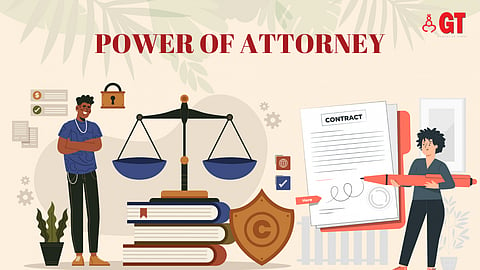

Mona was concerned about a Power of Attorney (PoA) that her dad had signed in favour of a friend a few years back. He was reviewing his decision on the PoA and Mona thought this was a good opportunity to learn more about PoA…
What is a PoA?
A PoA is a legal document by which a person authorizes another person to act on his behalf and confers specific rights and powers on the person. It is usually made when an individual cannot handle his intended transactions himself and would like to appoint another person to handle the transactions on his behalf. It can come into effect immediately or can take effect at a future date or on the happening of a future event.
Mona learnt that a PoA is governed by the Powers of Attorney Act, 1882 and the Indian Contract Act, 1872. It could cover powers like the authorization to handle finances and investments, property matters, tax matters, enter into contracts, make healthcare decisions or initiate or defend legal proceedings.
Its contents
A PoA contains:
Full name, age and address of the person making the PoA (with proof of identity and address) and photograph
Full name, age and address of the person authorized by the PoA (with proof of identity and address) and photograph
Full name and address of two witnesses
Duration of the PoA (if applicable)
Specific authorization/power being issued
Execution, Stamp Duty & Registration
A PoA is to be made in writing and signed by the person intending to authorize another person to act on his behalf. The PoA must clearly state the powers being given by the issuer to the other person. It is signed in the presence of a notary who is able to declare that the person signing the PoA is competent at the time of signing the document to issue the said power of attorney.
It usually includes the name and photograph of the person who is being authorized by the person issuing it. A PoA is to be executed on stamp paper of the value specified in the Indian Stamp Act, 1899.
While registration of a PoA is not mandatory, it is sometimes recommended to enhance the authenticity of the document. It can be registered in the office of the Sub-Registrar of Assurances under the Registration Act. Both the persons, i.e. the person making the PoA and the person appointed under the PoA must sign the PoA in the presence of two witnesses. A copy of the PoA is maintained in the Sub-Registrar’s records.
A PoA can be used by a non-resident Indian (NRI) authorizing a person in India for the sale or purchase of property, managing finances, and investments, etc in India, while the NRI is abroad.
If this PoA is executed abroad, it must be executed according to the regulations of the country it is executed in. Additionally, the signature of the person making the POA must be authenticated by the Indian Embassy in the country. Such a PoA executed abroad is required to be stamped and adjudicated within three months after its receipt in India.
Kinds of PoA
A PoA can be:
* Limited or Special PoA: A limited PoA gives the appointee power to do a specific act, such as authority to sell property on the appointer’s behalf. The power of the appointee is restricted to the acts specified in the PoA. This POA is used when the authority given needs to be only in a specified area or on a specific transaction. Once the purpose is fulfilled, this PoA immediately comes to an end.
* General PoA: A general PoA authorizes the appointee with very broad powers and rights, to execute legal transactions on behalf of the appointer. It usually contains a list of activities that the appointer wants the appointee to perform on his behalf. It is usually terminated when the person issuing the PoA dies or becomes incompetent, but the person issuing it can revoke the PoA at any time.
* Durable PoA: A durable PoA contains specific conditions that allow its validity to continue even when the appointer becomes incapacitated. An immediate PoA takes effect as soon as it is signed. The springing PoA takes effect when a specific event occurs, e.g. the disability or incapacity of the person. Such PoA are usually executed to deal with decisions involving healthcare or management of property.
Whom to appoint?
Mona knew that it was important to appoint a trustworthy and reliable person as a PoA. It is prudent to include in the PoA, that the appointed person is required to regularly report to a third person like a trusted accountant or lawyer. It also makes sense to check with all institutions with whom the person will be interacting on your behalf – this is particularly relevant when the bank/institution has its own requirements for such authorization.
With this understanding of the PoA, Mona was keen to understand how the PoA could be revoked.
The author has her focus on education, legal issues and governance and enjoys working with individuals and organizations towards enhancing their effectiveness.